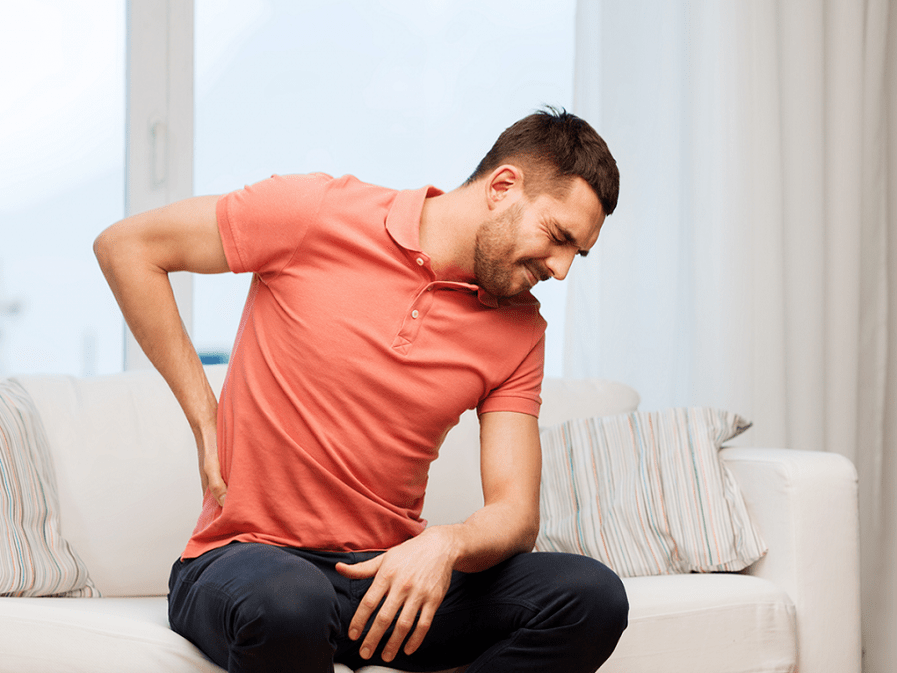
Low back pain can be associated with a variety of reasons, for example, muscle damage, intestinal pathology, protrusion, and spinal disc herniation. It is impossible to determine the exact cause on your own. Therefore, if discomfort occurs, it is necessary to undergo a diagnosis and follow the recommendations of the doctor. In most cases, medications and procedures are used for treatment. But surgery may also be necessary.
Lower back hurts: reasons
Low back pain can be associated with the spine, muscles, nerves, and other systems. The most common reasons are:
- Traumatic injuries to the lower back or other parts of the spine.
- Damage to muscle tissue or severe strain.
- Hernia, bulge.
- Curvature.
- Neuropathy
- Inflammatory processes of the vertebral tissues.
- Pinched nerve.
- Pathologies of the intestines, stomach, liver and other digestive organs (in this case, the pain also occurs in the lumbar region).
- Poisoning, intoxication.
- Pathologies of the excretory system: kidney failure, pyelonephritis, cystitis, kidney stones, ureters.
- Diseases of the uterus: cyst, fibroids, inflammatory processes.
What to do if your lower back hurts
It is impossible to reliably determine the source of pain at home. Therefore, in case of strange sensations, it is recommended to consult a doctor. If diagnosed early, treatment will be successful and fast. You should contact such specialists:
- Surgeon or Traumatologist: If the pain is associated with recent herbs, including sports or home herbs.
- Neurologist: sharp and stabbing painful sensations. It can be accompanied by sensation problems in the legs, loss of mobility. Symptoms such as goose bumps are also observed on the surface of the abdomen or on the legs.
- Gastroenterologist - prolonged pulling pain mainly on one side of the lumbar region. In addition, the sensations can be painful, accompanied by too frequent or difficult urination.
- Gynecologist - in this case, pain is observed on both one and two sides. In addition, they are accompanied by weakness, aggravated by walking and running, during menstruation and also during pregnancy.
In rare cases, when the cause of the pain is objectively clear, you don't need to worry. So, if the strange sensations are associated with a long stay in one position, physical activity, it is not necessary to consult a doctor. But if the pain does not go away for several days or is acute, it is necessary to make an appointment as soon as possible and undergo a diagnosis.
Low back pain: diagnosis
Diagnoses are prescribed by a doctor after examination, examination of complaints and medical history. The need for a specific procedure depends on the symptoms that accompany the pain:
- Spinal X-ray: hernias, lumps, back injuries, posture problems.
- MRI of the lower back: for hernias, curvatures, injuries and suspected neoplasia.
- Computed tomography of the lower back: the same indications as with MRI.
- Ultrasound - suspicion of pathology of the intestines and other organs located in the abdominal cavity.
- Colonoscopy, gastroscopy - these studies are carried out in case of suspected diseases of the gastrointestinal tract. In this case, the doctor not only examines the organs, but may also take a tissue sample (biopsy) for further investigation.
- Intestinal MRI is done to take a closer look at the gastrointestinal tract in order to confirm or verify a previously made diagnosis.
Treatment methods
The doctor determines the methods, duration, and treatment regimen based on the diagnosis. In most cases, the medication is indicated, for example, non-steroidal anti-inflammatory drugs. It is also possible to attend massage sessions, perform physiotherapy procedures.
If the diagnosis involves only surgical treatment, an operation is performed. This is necessary, for example, in the presence of hernias, peptic ulcer and other pathologies.
Back pain prevention.
Low back pain can be associated with work conditions and lifestyle. It is in the lumbar region where the main physical activity falls. This is especially dangerous when constantly lifting weights, playing sports, or getting injured at home.
For prevention, it is recommended:
- Get regular exercise.
- If the job is related to physical work, learn to lift weights correctly and not overload your back.
- If work is associated with a long stay in a sitting position, get up regularly, walk, change your posture.
- Avoid back hypothermia, dress for the weather.
- Keep your back straight when sitting and during the pose.
- Eat a balanced diet.
- Don't abuse alcohol, smoking, or other bad habits.
If the pains recur quite often, and even more so are acute in nature, you should immediately consult a doctor. It is important to understand that treatment often lasts for several months, especially when you are recovering from surgery. In this case, it is worth adjusting the lifestyle, if necessary, change jobs.



































